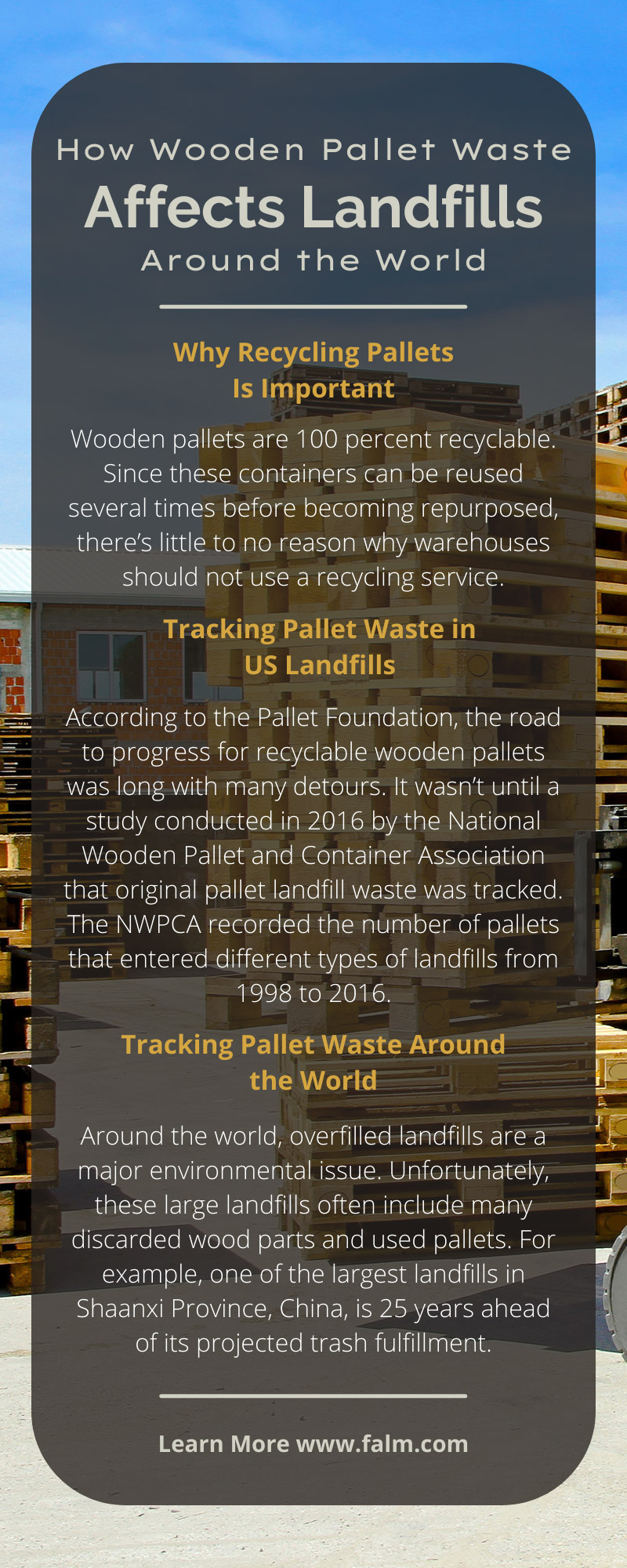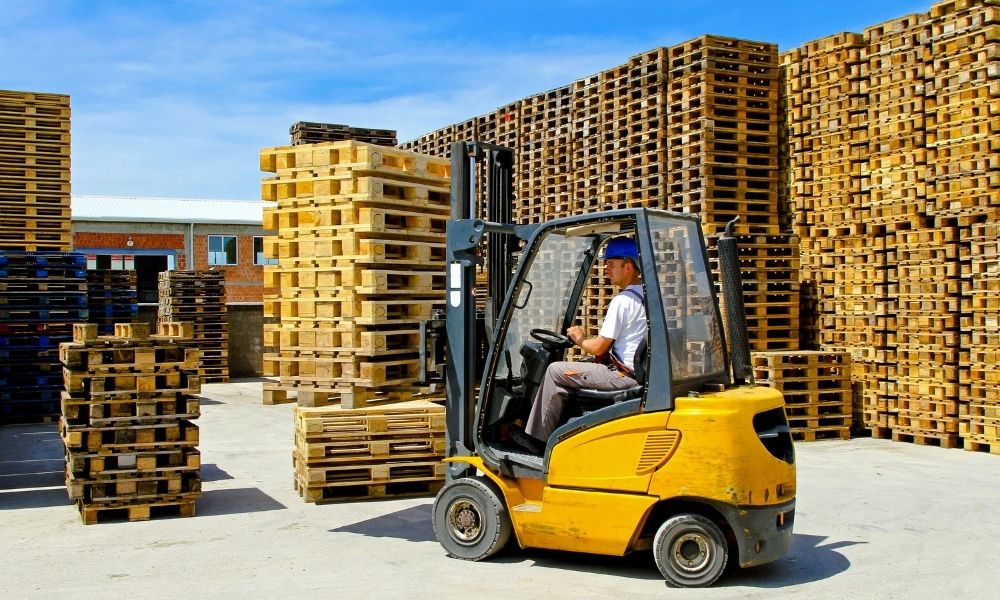As a warehouse manager or business owner, minimizing waste should be a primary goal for your operations. Not only is minimizing waste beneficial for the productivity and savings of your warehouse, but when you reduce the number of materials you waste in your facility, you also lower your carbon footprint. With more and more industries worldwide putting sustainability at the forefront of business planning, it’s essential to ensure that your warehouse facility includes eco-friendly practices as soon as possible.
One of the easiest and most effective ways to ensure that your warehouse avoids excessive waste is by participating in pallet recycling programs. When pallet users join these services, they can sell and buy pallets for reduced rates. Not only do businesses save money during this process, but pallet recycling also helps to avoid accumulating landfill waste.
In this article, we’ll examine how wooden pallet waste affects landfills around the world. Reviewing these recycling and waste practices worldwide will reveal how essential pallet recycling programs truly are. To learn more, keep reading.
Why Recycling Pallets Is Important
Wooden pallets are 100 percent recyclable. Since these containers can be reused several times before becoming repurposed, there’s little to no reason why warehouses should not use a recycling service.
Not only is using pallet services reasonable, but it’s also the standard for US pallet users. According to the USDA Forest Service, 95 percent of pallet users recycle their pallets. Wooden pallets rank above other recyclable materials such as plastic and steel.
This high percentage is essential for various reasons, but one of the most important results is reduced waste. The more pallet users recycle their pallets, the fewer businesses throw their pallets into landfills as waste. Since pallets are commonly used for business, it’s critical to avoid high levels of pallet waste inside landfills.
While 95 percent of pallets are recycled, this percentage was not always this high. Over the past few decades, manufacturers have worked to improve recycling programs in order to reduce pallet landfill waste.
Tracking Pallet Waste in US Landfills
According to the Pallet Foundation, the road to progress for recyclable wooden pallets was long with many detours. It wasn’t until a study conducted in 2016 by the National Wooden Pallet and Container Association that original pallet landfill waste was tracked. The NWPCA recorded the number of pallets that entered different types of landfills from 1998 to 2016.
According to the NWPCA study, the average number of pallets that entered municipal solid waste landfills and construction landfills decreased from 178.5 million in 1998 to 25.39 million.
This shrinkage in waste is the direct result of implementing pallet recycling services. The more pallets recovered from landfills, the less overall waste will accumulate.
Without this improvement of recovered pallets and recycling services, landfills all over the country would be packed with millions of decaying pallets. Not only would this have environmental effects, but businesses would also ultimately run out of waste space at a faster rate.
Unfortunately, while the US has improved its practices to recycle pallets, other countries still have a considerable accumulation of pallet waste stuck in their landfills.
Tracking Pallet Waste Around the World
Around the world, overfilled landfills are a major environmental issue. Unfortunately, these large landfills often include many discarded wood parts and used pallets. For example, one of the largest landfills in Shaanxi Province, China, is 25 years ahead of its projected trash fulfillment.
Despite its enormous size and space, Jiangcungou continues to decrease in size for future waste. With less and less space becoming available for pallet waste, the need for global pallet recycling services is even more urgent.
Other countries such as India similarly struggle with decreasing available landfill space to continue placing used pallets in.
Examining how the placement of used pallets in landfills has affected the environment of other countries is vital. As less and less space is available for pallet dumping, more and more businesses should consider the benefits of participating in pallet recycling programs.
How Does Pallet Recycling Prevent Landfill Waste?
So how does recycling the materials of your used pallets prevent the buildup of landfill waste? Manufacturers may recycle pallets in several different ways. For example, pallet users most commonly reuse their pallets or sell their used pallets at a discounted rate. In addition, since wooden pallets have such high durability, these containers are likely to withstand several lifespans.
The second way that manufacturers prevent landfill waste by recycling pallets is through repurposing. Repurposed pallets are pallets that can no longer be used for storage, shipping, or delivery. Since these broken pallets are unsalvageable, manufacturers instead grind parts of these pallets into mulch and sell this resource as an alternative revenue stream.
With so many different ways to reuse pallets that benefit both pallet users, businesses, and the environment, there’s no reason not to embrace pallet recycling services.
The Takeaway
Looking back at how wooden pallet waste affects landfills around the world, it’s fascinating to see how much progress the US has made in decreasing its overall wooden pallet waste. However, although the US has made progress in pallet recycling, manufacturers must continue to minimize pallet waste to even lower percentages.
As pallet waste continues to be an issue worldwide, more recycling services must be made available so that businesses can take advantage of improved economic and environmental benefits. In addition, utilizing more pallet recycling programs will help companies be more successful and sustainable.
How FALM Will Help
Ready to embrace pallet recycling services for your own facility? If so, First Alliance Logistics Management (FALM) has you covered. Here at FALM, we provide pallet management services and pallet resources for a variety of businesses and pallet users in the industry.
So whether you need more information on pallet recycling programs or prefer to learn more about the pallet grading system, we’ll be your expert resource. Our FALM team has years of industry experience and expertise to share. In addition, we’ll provide knowledgeable and personalized customer service to your business.
To learn more about our team, services, or business, check out our First Alliance Logistics Management website for more information.


